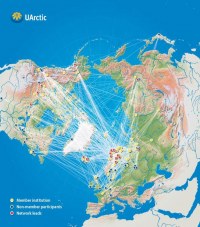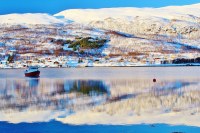
On June 13, 2015, Nizhnevartovsk State University was officially admitted as a member of the University of the Arctic (UArctic).
The 18th meeting of the Council of UArctic was held June 14-17, 2015 at the Buryat State University in Ulan Ude within the joint education and research conference “Arctic Dialogue in the Global World”. During the meeting, the Council held an open voting on including additional institutions and organizations as Council members. As a result, NVSU became a new UArctic member.
http://www.uarctic.org/news/2015/6/the-council-of-uarctic-welcomes-new-members-during-first-day-of-2015-annual-meeting/
 The University of the Arctic (UArctic) is a cooperative network of universities, colleges, research institutes and other organizations concerned with education and research in and about the North. The official launch of the University of the Arctic took place in 2001.
The University of the Arctic (UArctic) is a cooperative network of universities, colleges, research institutes and other organizations concerned with education and research in and about the North. The official launch of the University of the Arctic took place in 2001.
The overall goal of the University of the Arctic is to create a strong, sustainable circumpolar region by empowering indigenous peoples and other northerners through education, mobility and shared knowledge.
There are currently over 170 member institutions and organizations from Russia, Canada, USA, Finland, Norway,Switzerland, Sweden, Norway, Iceland, Denmark/Greenland. Russian membership includes 46 institutions and organizations.
The UArctic offers the following programs:
The north2north student exchange program provides opportunities for students from UArctic member institutions to study at other UArctic institutions.
Northern Teaching Resources Exchange program, NorthTREX, provides opportunities for northern teachers to gain circumpolar experiences and perspectives, and strengthens northern institutions’ abilities to share faculty resources and promote mutual cooperation.
Bachelor Of Circumpolar Studies - BCS program, a major academic program of the UArctic, gives students the opportunity to learn about the lands, peoples, and issues of the circumpolar world and prepares them for advanced study or professional employment in fields as diverse as sustainable resource management, self-government, Arctic engineering, and northern tourism. Special emphasis is given to matters concerning Indigenous people of the Circumpolar North.
Graduate Networks is a cooperation program for graduates and post-graduates. The program supports the development of cooperation networks for future researchers in various subject areas, including the indigenous population of the North. The program promotes the establishment of scientific relations of young researchers with the scientific organizations of the South, who are interested in studying the issues of the North. It supports cooperation with the Association of Young Researchers of the Arctic (APECS).
The UArctic Field School program supports the organization of field schools, expeditions, seminars, and onsite study of northern issues, organized by northern institutions individually or jointly with other partners.
Thematic Networks is one of the promising areas of the UArctic. Thematic Network is an association of experts in a particular area of the Arctic, created in order to consolidate the efforts and expertise aimed at promoting cooperation of experts from different countries. Various Thematic Networks contribute to the establishment of sustainable scientific and academic links between universities - members of the University of the Arctic.
Currently, the UArctic has 19 Thematic Networks:.jpg)
1. Northern Tourism (8 members).
2. Social Work (27).
3. Health and Well-being in the Arctic (14).
4. Digital Media and Media Arts (4).
5. Distance Education and e-Learning (4).
6. Arctic Engineering (5).
7. Geopolitics and Security (10).

8. Global Changes (25).
9. Indigenous Arts and Crafts (4).
10. Journalism (5).
11. Local and Regional Development in the North (30).
12. Northern Agriculture (3).
13. Northern Governance (21).
14. Arctic Engineering and Technology (6).
15. Verdde Teacher-training Program for Indigenous People of the North (6).
16. Local Communities and Joint Management of Natural Resources (6).
17. World Images of Indigenous Peoples of the North (6).
18. Environmental Impact Assessment of Industry Contaminated Areas (9).
19. Arctic Coastal and Marine Areas (2).
Thematic Networks are coordinated by Thule Institute of the University of Oulu.
GoNorth offers opportunities for students from the south to go study at a northern higher education institution and experience life in the Circumpolar North, and schools of the southern regions could find partners among Arctic universities.
Mimir Programme promotes the development of joint research projects and activities coordinated by the University of the Arctic with the working groups of the Arctic Council and the International Arctic Science Committee (IASC), International Arctic Social Sciences Association (IASSA), as well as the other Arctic research organizations and projects.
UArctic Study Catalogue offers northern relevant courses and programs offered by institutions throughout the eight Arctic countries in the Arctic region. It is a marketing means for the northern research aimed at southern consumers within GoNorth program and offers opportunities to effectively promote and advertise particular schools.



 The University of the Arctic (UArctic) is a cooperative network of universities, colleges, research institutes and other organizations concerned with education and research in and about the North. The official launch of the University of the Arctic took place in 2001.
The University of the Arctic (UArctic) is a cooperative network of universities, colleges, research institutes and other organizations concerned with education and research in and about the North. The official launch of the University of the Arctic took place in 2001..jpg)
